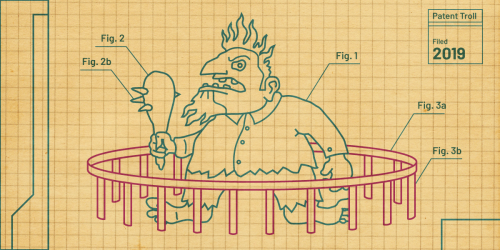Philip Johnson is Chief Intellectual Property Counsel of Johnson & Johnson, one of the largest pharmaceutical companies in the world. He is also a representative member of the Coalition for 21st Century Patent Reform, the leading trade group opposing patent reform this past year.
And now he's rumored to be next in line to be the director of the United States Patent and Trademark Office.
What?
That's exactly what we're asking ourselves. Why would an administration that has ostensibly been so pro-reform over the last year nominate such an entrenched insider? (Though perhaps this isn't so shocking a question, as those of us working on the net neutrality fight would remind ourselves.) Although it would seem that Johnson is eminently qualified as a patent expert, many of his views lie contrary to recent reform efforts—including reforms proposed by the White House itself.
The Coalition for 21st Century Patent Reform, or 21C, represents companies in the pharmaceutical and biotech industries, among others. These industries, flanked by trial lawyers and universities, helped water down and ultimately kill patent reform this year. In fact, Johnson's employer, a member of 21C, was recently called out as leading the charge against patent reform.
For example, 21C worked to remove the expansion of covered business method (CBM) patent review from proposed legislation [PDF], which is a big part of the reason why language around such reform didn't appear in the final version of the House's Innovation Act nor the latest Senate proposals. Johnson's perspective lies directly contrary to the White House's proposal in early 2013, recommending that the legislature expand the CBM provision to include computer-enabled patents.
The latest versions of the Senate bill—known as the "Schumer-Cornyn Compromise"—contained solid language about stays of discovery and heightened pleading, both of which 21C had vigorously opposed [PDF] and worked to remove.
What We Need Instead
What we need is someone who understands the problems with patent law, especially when it comes to software patents. Some are pointing to the fact that David Kappos, the previous director of the Patent Office, was from the tech industry, so the next one has to come from pharma or biotech. This push does a great job of highlighting the fact that one single patent system shouldn't apply to technologies as different as pharmaceuticals and software. In any event, the nominee to head the Patent Office shouldn't be the face of opposition to patent reform that was championed by the White House, passed by a majority of the House, and supported by a considerable proportion of Senators.
We need someone who would champion needed reform—not just tackling trolls, but focusing on the most pressing issue in the patent world: quality. When Kappos became director of the Patent Office in 2009, he inherited a huge backlog of unexamined (or rejected and refiled) patent applications, and he set out to fix this problem. His solution, however, was to lower standards, allowing a flood of low-quality patents to issue.
The patent logjam is a symptom of a system that allows poor quality patents. When the issuance rate for applications is so high, of course more people are going to apply for patents. And more of these applications are going to be very stupid. And more of these patents will haunt our innovation space just shy of two decades from now.
Let's not appoint someone who prefers the status quo when it comes to the most serious patent issues—especially when his views run contrary to the Obama Administration's stated positions. Instead, we need a director who understands that bad patents are the root of the many problems we see today, and who will see the need to reject quantity in favor of quality.







